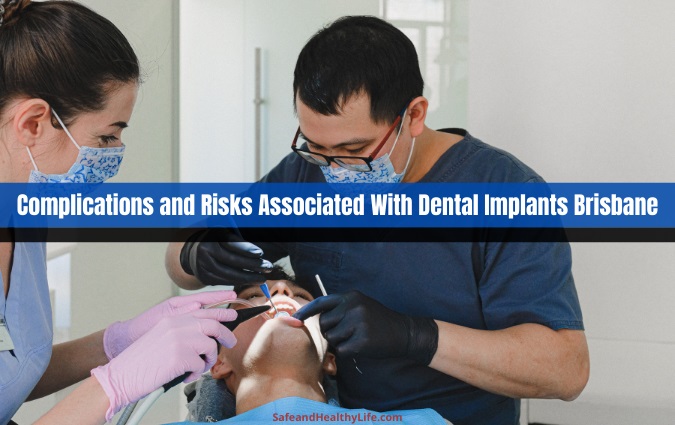
Dental implants are a great solution for restoring one or more missing teeth. People lose their natural teeth due to a variety of issues, such as accidents, sports injuries, side effects of medication, and soon.
Dental implants are best described as anchors that are placed in your jawbone to provide permanent support for crowns or dentures that are fitted as artificial teeth in your mouth.
Though the popularity of dental implants, which is a restorative dentistry treatment procedure, has increased over the years, you cannot ignore the risks and complications associated with it. Just like every other dental treatment, this treatment also has certain negative points.
Therefore, before going for dental implants Brisbane, you should equip yourself with all the necessary information related to this treatment option.
We understand that you might not be an expert when it comes to dental health, so, we have covered some information about dental implants in this article. Please continue further to get answers to all your queries.
Why Dental Implants are Considered Risky?
Though dental implants are made from titanium alloy or ceramic, which is considered to be an ideal material for building dental prostheses, they can still turn out to be dangerous in the case of some patients.
The reason attributing for this fact is that these implants are inserted into the jawbone with the help of oral surgery.
Which Complications are Related to Dental Implants?

Photo Credit: Pixabay
We have listed some of the complications related to dental implants below:
- Improper Osseointegration
One of the most common problems with dental implants is the incorrect fusion of the implant surface (osseointegration) with the surrounding bone. There are several factors that can cause osseointegration to fail.
These factors include limited availability of bone to stabilize the implanted root, infection at the implant recipient site, overheating of the jawbone, pressure on the dental implant immediately after implantation, or impaired blood supply.
- Dental Implant Rejection
Every implant in the body is treated as a foreign substance that can be rejected by the body. If the dental implant or jaw gets affected by bacteria during implantation, the implant will be rejected by the patient’s body. Infection is the main reason why dental implants are rejected.
- Dental Implant Failure
Dental implant failure can occur in some patients, although it is rare. Excessive pressure on the newly implanted post or screw can cause partial or total fracture of the dental implant.
Grinding your teeth at night while you sleep (medically called bruxism) can disrupt the position of the implant and ultimately lead to failure. To protect the implant during sleep and rest, you may need to wear a mouthguard.
- Prolonged Pain
Some patients may experience persistent pain in the placement area. This can be caused by severe local inflammation or the placement of the root of the prosthesis near large or even small nerve branches.
There are various methods of intervention in this situation. If the pain continues for too long, the implant should be removed.
- Infection
Inserting an implant can cause infection in the surrounding areas of the implant. As the implant, i.e., the artificial tooth root is surgically implanted in the jaw, the surrounding tissues can become infected. Infections can appear during surgery or the placement of a dental crown. Poor oral hygiene can also lead to infections.
- Nerve Damage
Nerve damage from overpreparation at the implant site is another possible complication that can cause numbness (paraesthesia), pain, and persistent tingling in the tongue, gums, lips, or chin. You should look for these symptoms and visit your dentist as soon as possible.
- Injury to Neighbouring Teeth
It is quite possible that the neighboring teeth of the teeth being treated get injured during the placement of the dental implant.
Injuries can occur during the preparation of the receiving site. The dentist might damage the adjacent teeth accidentally during the drilling process.
- Allergic Reactions
Allergic reactions are also among the most common problems encountered by the patients who undergo the treatment procedure of dental implants. This phenomenon has a higher chance of occurrence when the implants used are made from titanium.
Titanium dental implants can cause allergic or inflammatory reactions in patients with metal allergies.
These metal implants can cause galvanism, allergies, and inflammation of the bones and gums around the dental implants.
You might have gotten worried by reading all these downsides of dental implant treatment. But we must tell you that you should not worry at all. The advances in the field of dentistry have increased the success rate of all the treatments.
Moreover, you should remember that in order to eliminate the above complications and problems, you should visit the dentist who performs the implant placement procedure for you. You should schedule an appointment with them on a regular basis.
Wrapping Up
Dental implant treatment is highly beneficial for patients who want to get an ideal dental appearance after losing single or multiple teeth. But you must consult a reputable dentist to make sure that you don’t encounter any of the downsides of this treatment.
About The Author:
Stacey Smith is a freelance health writer. She is passionate to write about women’s health, dental health, diabetes, endocrinology, and nutrition and provides in-depth features on the latest in health news for medical clinics and health magazines.




